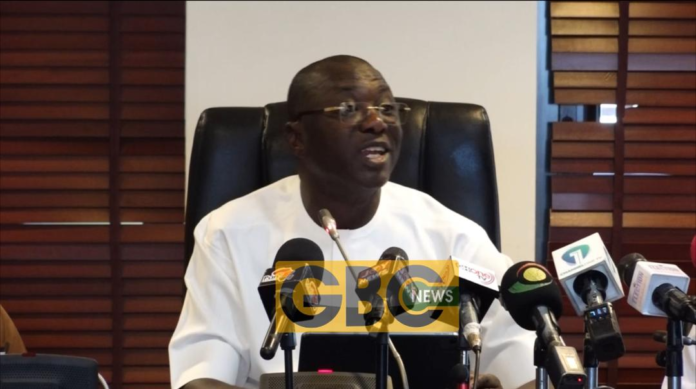The Minority New Patriotic Party (NPP) caucus in Ghana’s Parliament has vowed to fiercely resist any attempt by the government to increase its appropriation for the 2026 fiscal year, insisting that the administration has failed to fully utilise the funds allocated for 2025.
Their stance sets the stage for what could become a major budget battle when the Appropriation Act for 2026 is laid before Parliament for final approval.
Background
Parliament approved GH₵293.1 billion for the 2025 financial year under the Appropriation Act, 2025 (Act 1126). However, according to the Ranking Member on the Finance Committee, Dr. Mohammed Amin Adam, large portions of this budget remain unimplemented nearly a year on. He argues that since the new government assumed office, both the 2025 Budget and the Mid-Year Review have been poorly executed, resulting in severe constraints on ministries, departments and agencies (MDAs). Many, he claims, are struggling to function effectively—some without fuel—while public sector staff lack basic working tools.
“This is fiscal indiscipline,” the former Finance Minister declared at a press briefing last Friday. He insisted that the government has no justification to seek additional funding for 2026 when it has shown little capacity or commitment to utilise what was already approved by Parliament. On this basis, the Minority says it will oppose any upward adjustment in the upcoming appropriation bill.
Weak Budget Execution at the Heart of Minority Concerns
The Minority’s critique focuses heavily on what it describes as persistent under-execution of key expenditure items. Official budget releases for 2025 show significant gaps between planned spending and actual disbursements—particularly in priority areas that drive growth and service delivery.
For Goods and Services, GH₵5.1 billion was programmed for the first three quarters of 2025, yet only GH₵3.8 billion was released. This represents just 56% of the approved annual figure of GH₵6.7 billion. Capital Expenditure (CAPEX) performance is even more troubling: Of the GH₵26.6 billion expected to be spent between January and September, only GH₵11 billion was disbursed—representing 34% of the GH₵32.6 billion approved for the year.
Dr. Amin Adam warned that the trend reflects a deliberate pattern of under-execution of public investment, which he described as “damaging to long-term economic growth.” He linked the shortfalls to deeper structural problems—revenue underperformance, persistent auction failures, and rising interest payments that continue to crowd out essential spending.
“When government cuts capital spending to solve short-term cash shortages, the long-term cost to the economy is enormous,” he cautioned. Contractors accumulate arrears, banks record higher non-performing loans, SMEs struggle to access capital, and major infrastructure projects stall. What appears to be savings, he argued, eventually manifests as economic setbacks.
“Government has prioritised accounting optics over economic substance,” he added. “What the Finance Minister is doing is not fiscal discipline—it is fiscal deception.”
Under-Investment and Its Wider Economic Toll
Parliament approved capital spending equivalent to 1.5% of GDP for 2025. Yet only about 0.5% has been executed so far—a figure the Minority believes may even be overstated. For a government that campaigned on a transformative “Big Push Agenda,” Dr. Amin Adam described the shortfall as “heartbreaking.”
The gap, roughly one percentage point of GDP, translates into more than US$1.1 billion in foregone public investment. According to the Minority’s analysis based on Ghana’s macroeconomic parameters, the under-investment has already triggered:
-
A 0.514% cut in effective demand
-
A 0.41% contractionary impact on GDP (approximately US$469 million)
-
A tax revenue loss of roughly US$75 million
-
A forgone growth rate of about 0.1 percentage point
“The government has traded tomorrow’s output for today’s optics,” the Ranking Member reiterated.
Revenue Targets Set for 2026 Described as Overly Ambitious
The government expects to collect GH₵268.1 billion in 2026—an 18.3% increase over the 2025 target. However, the Minority considers these projections unrealistic. The numbers rely heavily on improvements in compliance and digitalisation-led revenue reforms that historically take several years to materialise. The projections also assume that non-oil tax revenue will rise by nearly 19%.
According to Dr. Amin Adam, if revenues fall short—as they did in 2025—the government will be forced to either introduce new taxes, accumulate arrears, or cut capital and social spending. “The revenue optimism in the 2026 Budget may be masking future fiscal distress,” he warned.
Market Signals Point to Low Confidence
The Minority also cited the continued collapse in market confidence as evidence that investors doubt government’s fiscal management. Of the 45 domestic bond auctions conducted in 2025, 25 failed—a 55% failure rate. Investors, they noted, are increasingly shifting toward short-term instruments to hedge against uncertainty about the government’s medium-term outlook.
These auction failures have forced government into expensive short-term borrowing, which increases rollover risks and deepens fiscal vulnerabilities. A cumulative auction shortfall of GH₵17.5 billion, the Minority argues, represents a clear vote of no confidence.
Market reactions during budget week further reflected this trend: the GSE Composite Index fell by 0.69%, while the Financial Stocks Index dipped by 0.12%. “At a time when markets should be responding positively to a new budget, this decline tells a different story,” Dr. Amin Adam said.
Banks and financial institutions, traditionally strong buyers of government securities, are reportedly becoming more cautious, resulting in tightening liquidity conditions that could further stall the economy.
As Parliament prepares to scrutinise the 2026 Budget and Appropriation Bill, tensions between the Majority and Minority appear to be hardening. With the Minority declaring a firm stance against any increase in appropriation, the debate over government spending priorities is set to dominate the legislative agenda in the coming weeks.
By: Christian Kpesese



